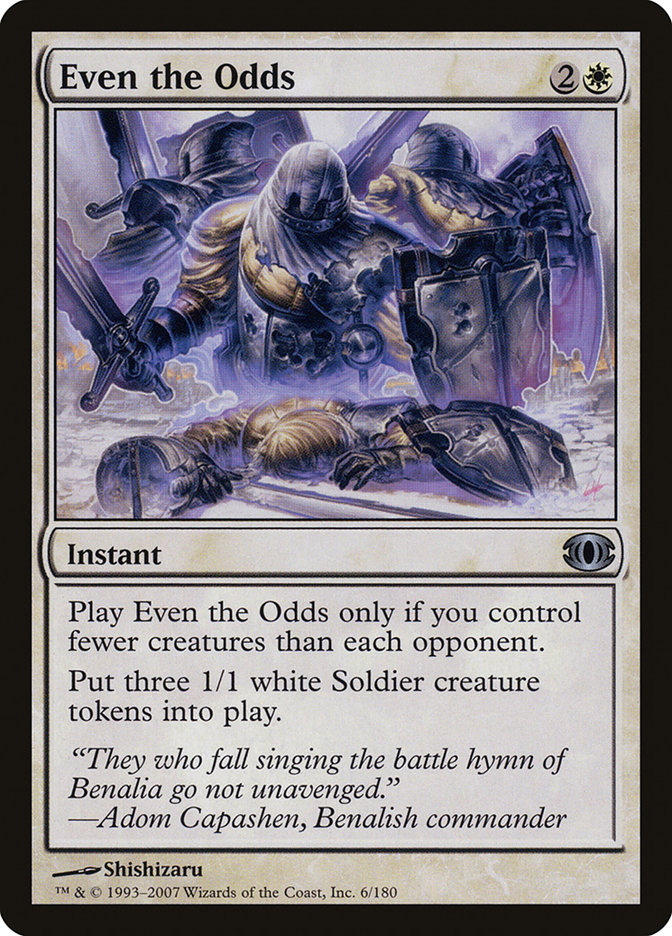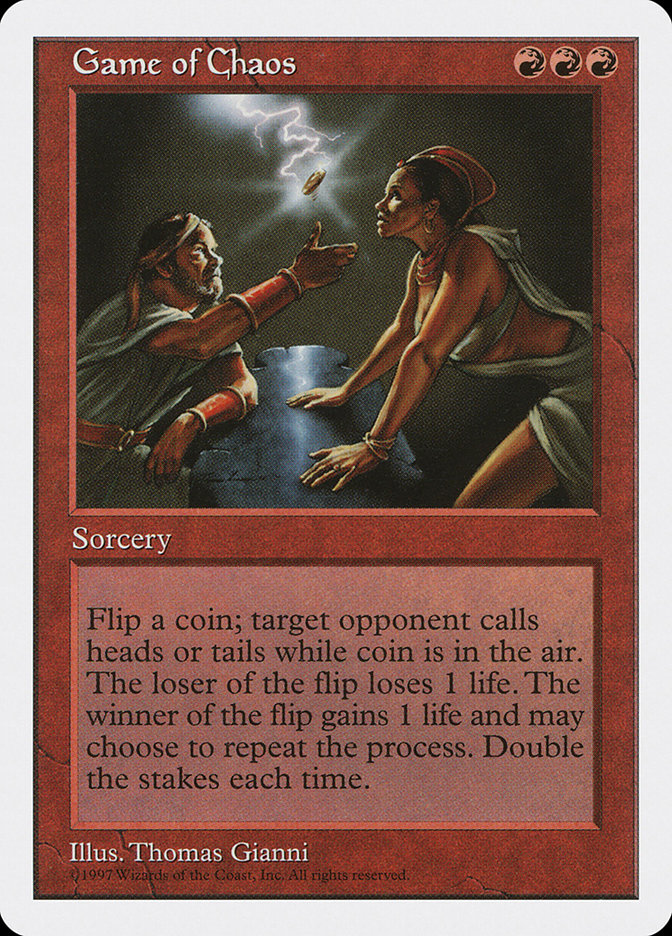In Magic: the Gathering tournaments, it’s part of tournament procedure to
shuffle and cut your opponent’s deck every time the deck needs to be
randomized. This is often the first thing you do when sitting down for a
match of Magic. You shuffle your deck, then present it to your opponent to
shuffle it again. No one questions this, and everyone understands why it
must be done. It’s a precaution against cheating.
It’s an unfortunate truth, but we know that cheating happens in Magic
tournaments. That’s why we have so many precautions set up against it; we
have the Judge Program in place to arbitrate any time a player sees
something that is wrong and needs to be fixed. Most of the time these are
honest mistakes that are easily fixed by the Judges, but part of a Judge’s
role is to figure out if there is any malicious intent taking place.
It has recently come to my attention that there’s part of the Magic
tournament that has very little policy surrounding it, and its potential
for abuse is very concerning. That part is the act of randomly determining
who goes first in the match, traditionally done via dice roll.
Not too long ago at a tournament, I was playing against someone on
coverage, with the oversized coverage dice that they use for visibility. It
came time for us to randomly determine who was going to play first in the
match, so I did what I had always done and had never really questioned. I
picked up two dice and asked my opponent if he would like to “high roll” to
see who goes first. He agreed, and I rolled the two large dice. I ended up
rolling a three; the dice showed a one and a two. That’s fine, sometimes
you roll low.
But what happened next really scared me. My opponent picked up the dice,
looked at them in his hand, and effectively turned them over onto the
table. Sure enough, he plopped down a six and a five, the opposite side of
each die from the two and the one that I had rolled. I was stunned.
I called a judge and explained what I saw. My opponent adamantly denied
that he intended to do this, and when the judge asked him to recreate his
actions, he reproduced a similar but slightly sloppier action which caused
the dice to roll a bit, demonstrating an apparently random roll.
I felt like I had no recourse, and that my opponent’s actions were
essentially “free” because no one else was there to see anything and we
weren’t on camera yet. Thankfully, the judge decided to have us redo the
die roll, which I happily lost, because at least this time it felt fair.
But even this left a bad taste in my mouth.
Can anyone just call a judge any time they lose a die roll and claim that
they didn’t feel like it was a fair roll? Something, in my mind, had to
change. The system felt, and still does feel, easy to abuse.
There aren’t really any good precautions set into place to prevent this
kind of thing from happening. We know that shuffle cheats have happened in
the past, so we have set up precautions that are simply built into the
tournament structure to prevent these kinds of things from happening. It
would be crazy if no one ever cut their opponent’s deck and you were the
only one able to manipulate your library. But I feel like that’s where we
are with die rolls. Rolling just two dice is so easily manipulated,
especially if you’re rolling them after your opponent.
I decided to set into place my own precautions for my own personal die
rolls. I refuse to ever “high roll” just two dice to determine who goes
first in a match. I started asking my opponent to roll three dice. Even
more recently, I’ve preferred to roll just one die, and have my opponent
call odd or even. I have a strong preference that I roll the die, because
if it’s going to be up to me, I just don’t want my opponents touching dice
anymore. This doesn’t mean I think everyone is out to cheat me, but it
seems silly to not have some kind of precaution in place.
Just this past weekend, I had an interaction where my opponent pulled out
two oversized dice and offered to “high roll” them. I politely declined,
and asked if he wanted to roll just one, smaller die and call odd or even.
He said, “No, I want to high roll these two dice.” I then offered to “high
roll” with three smaller dice instead. He again refused, and insisted on
rolling his two golf ball sized dice.
I’d like to give my opponent the benefit of the doubt and assume that he’s
not trying to cheat me. Maybe he just really likes his large dice. But
fortunately for me, I don’t have to give anyone the benefit of the doubt in
this scenario, especially at a competitive level Magic tournament. There
was no way I was going to let him roll those two large dice, for the same
reason that I’m simply never going to not cut my opponent’s deck after they
shuffle it. So I called a judge and told him that my opponent and I could
not agree on a method of randomly determining who had the option to go
first in the match. The judge then happily pulled out his phone and used
that to randomly determine who went first. It was fantastic.
But that whole interaction is what really prompted me to write this
article. Maybe my opponent wasn’t cheating in die rolls. But what if he
was? I know for a fact that some people know how to plop down large numbers
on a die, even two dice. Especially if the dice are larger. My opponent
refusing to do anything but roll his very large dice threw up a ton of red
flags for me. How many people in this tournament didn’t think twice and
just rolled his dice?
There are so many precautions in the tournament culture to prevent shuffle
cheating. Many competitive players even know to watch their opponents’ eyes
while they shuffle decks. It’s not because we think that we’re getting
cheated all of the time, but it seems silly not to take every precaution
available to us at all times. So why don’t we have similar precautions with
die rolls? Are we just going to let someone who knows how to manipulate
dice have the option to play or draw every round?
I brought all of this up on my car ride home with Dylan Donegan, Todd
Stevens, and Ross Merriam. They all agreed that there wasn’t really
anything in place to stop this kind of thing from happening.
Ross Merriam then told us that he had come up with an excellent way to
determine who goes first, one that seemed more or less perfect. He liked
the concept of rolling a die and calling odd or even, which is what I have
defaulted to in the past. But the difficulty lies in who gets to roll the
die. I have always had a preference to be the player rolling the die, but I
understand that that isn’t really fair to my opponent. I may know that I’m
not cheating, but they have no way to confirm that.
Ross suggested that the players agree to first determine which player was
“odd” and which was “even,” and then both roll a single die at the same
time. The sum of these two dice would be the odd or even number used for
determining which player gets the option to go first. This way, both
players are rolling a die but have no way at the time of rolling what
result will benefit them.
The only problem that I could see happening here is that not everyone knows
that the sum of two six sided dice has an equal chance of being odd or
even. Some players may be hesitant to agree to odd or even on the sum of
two dice. The easy way to explain that it is an even split is that one die
will show a face, and no matter what face it is, there will be three
results on the other die that make the sum even, and three results that
will make the sum odd.
A perfect 50/50 split.
But this isn’t even the most ideal way to determine who gets to go first in
a match that I have heard of. Someone told me before that they wished that
when pairings are announced, the player who will have the option will be
listed on whatever medium those pairings are put up in. This would be
determined ahead of time by the tournament software, and could be found by
the players either on the pairings boards, or more recently on the online
websites used by TOs that are accessible by phone.
This would easily remove all ambiguity from the die roll situations,
because they simply wouldn’t have to exist anymore. You would know when
sitting down at your match if you were on the play or the draw and it would
always be perfectly fair.
If we really wanted to go deep on this idea, we could adopt what is used in
chess tournaments to determine who gets to play the white pieces and goes
first. The tournament software looks at who in the match has been white and
gone first less often in the tournament, and assigns that player the white
pieces, allowing them to go first. In the first round, and each subsequent
round where players have been white the same amount of time, it is
determined randomly. This results in a more even spread and reduces the
amount of time where players can “run cold” and be on the play a
significantly low portion of the time.
It would also have the added benefit of me not having to hear people
complain about die rolls all of the time.
Until those changes happen to the tournament structure, I’m going to be
using Ross Merriam’s suggested method of choosing odd or even and using the
sum of two dice each rolled by each player to determine who goes first.
Perhaps you should too.



